Tennessee's 2nd congressional district
| Tennessee's 2nd congressional district | |||
|---|---|---|---|
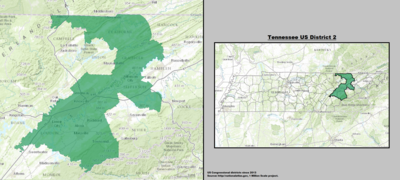 Tennessee's 2nd congressional district - since January 3, 2013. | |||
| U.S. Representative |
| ||
| Distribution |
| ||
| Population (2016) | 740,182[2] | ||
| Median income | $52,025[3] | ||
| Ethnicity |
| ||
| Cook PVI | R+20[4] | ||
The 2nd congressional district of Tennessee is a congressional district in Tennessee. It currently includes the east central part of the state.
The district is based in Knoxville, and is largely coextensive with that city's metropolitan area. It includes most of that city's suburbs. It includes the cities and towns of Alcoa, Bean Station,
Dandridge, Farragut, Harrogate, Jefferson City, Jellico, Loudon, Lenoir City, Maryville, Powell, Rutledge and Tazewell.
The 2nd is one of the safest districts in the nation for the Republican Party. It is one of the few ancestrally Republican districts in the South. No Democrat has represented the district since 1855, and Republicans (or their antecedents) have held the district continuously since 1859. It was one of only two districts in Tennessee (the other being the neighboring 1st district) whose congressmen did not resign when Tennessee seceded from the Union prior to the Civil War.
Because most of its residents supported the Union over the Confederacy, the people almost immediately identified with the Republicans after hostilities ceased. Much of that sentiment was derived from the region's economic base of small-scale farming, with little or no use for slavery; thus, voters were mostly indifferent or hostile to the concerns of planters and other landed interests farther west in the state, who aligned themselves with the Democratic Party. This loyalty has persisted through good times and bad since then.
From the end of Reconstruction through the 1950s, the Republican Party in Tennessee was more or less nonexistent outside East Tennessee. However, in the 1960s conservative white Democrats, especially in suburban Memphis and Nashville, began voting for the likes of Barry Goldwater, Howard Baker (whose father and stepmother were representatives from the 2nd in the 1950s and 1960s), and Richard Nixon. At bottom, the conservative Democrats in the other Grand Divisions were almost as conservative as Republicans in East Tennessee. Traditional East Tennessee Republicans began welcoming conservative Democrats into their party, and they have worked more or less together as a coalition ever since.
A few pockets of Democratic voters exist in the downtown areas of Knoxville, which has occasionally helped elect Democratic mayors and send a few Democrats to the state legislature. However, they are no match for the overwhelming Republican tilt in most of Knoxville itself, as well as the suburban and rural areas, the Knoxville suburbs. Coal miners in the far northern fringe of the district also supported Democrats from the 1930s onward. Much of the coal-mining region was drawn into the 4th district after the 1980 Census, but was returned to the 2nd after the 2010 census.
This district traditionally gives its congressmen very long tenures in Washington. Since 1909, it has had only seven congressmen (not including caretakers). Before the 1950s, its congressmen were among the few truly senior Republican congressmen from the South.
With the retirement of Jimmy Duncan, the 2018 congressional election saw former Knox County Mayor Tim Burchett get elected receiving 65.94% of the total votes cast.
Contents
1 Election results from presidential races
2 List of members representing the district
3 Historical district boundaries
4 See also
5 References
Election results from presidential races
| Year | Result |
|---|---|
2004 | George W. Bush 64 - 35% |
2008 | John McCain 64 - 34.5% |
2012 | Mitt Romney 67.3 - 31% |
2016 | Donald Trump 65 - 29.7% |
List of members representing the district
| Member | Party | Years | Electoral history | District location |
|---|---|---|---|---|
| District created March 4, 1805 | ||||
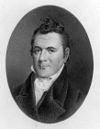 George W. Campbell | Democratic-Republican | March 4, 1805 – March 3, 1809 | Redistricted from the at-large district and re-elected in 1805. Re-elected in 1807. Retired to become judge of the Tennessee Supreme Court. | "Hamilton district" |
 Robert Weakley | Democratic-Republican | March 4, 1809 – March 3, 1811 | Elected in 1809. Retired. | |
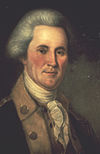 John Sevier | Democratic-Republican | March 4, 1811 – March 3, 1813 | Elected in 1811. Re-elected in 1813. Re-elected in 1815. Died. | |
| March 4, 1813 – September 24, 1815 | [Data unknown/missing.] | |||
Vacant | September 24, 1815 – December 8, 1815 | |||
William G. Blount | Democratic-Republican | December 8, 1815 – March 3, 1819 | Elected to finish Sevier's term. Re-elected in 1817. [Data unknown/missing.] | |
John A. Cocke | Democratic-Republican | March 4, 1819 – March 3, 1823 | [Data unknown/missing.] | |
Jackson Democratic-Republican | March 4, 1823 – March 3, 1825 | [Data unknown/missing.] | ||
Jacksonian | March 4, 1825 – March 3, 1827 | [Data unknown/missing.] | ||
Pryor Lea | Jacksonian | March 4, 1827 – March 3, 1831 | [Data unknown/missing.] | |
Thomas D. Arnold | Anti-Jacksonian | March 4, 1831 – March 3, 1833 | [Data unknown/missing.] | |
Samuel Bunch | Jacksonian | March 4, 1833 – March 3, 1835 | [Data unknown/missing.] | |
Anti-Jacksonian | March 4, 1835 – March 3, 1837 | [Data unknown/missing.] | ||
Abraham McClellan | Democratic | March 4, 1837 – March 3, 1843 | [Data unknown/missing.] | |
William T. Senter | Whig | March 4, 1843 – March 3, 1845 | [Data unknown/missing.] | |
William M. Cocke | Whig | March 4, 1845 – March 3, 1849 | [Data unknown/missing.] | |
Albert G. Watkins | Whig | March 4, 1849 – March 3, 1853 | [Data unknown/missing.] | |
William M. Churchwell | Democratic | March 4, 1853 – March 3, 1855 | Redistricted from the 3rd district. [Data unknown/missing.] | |
William H. Sneed | American | March 4, 1855 – March 3, 1857 | [Data unknown/missing.] | |
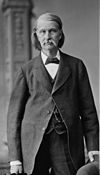 Horace Maynard | Know Nothing | March 4, 1857 – March 3, 1859 | [Data unknown/missing.] | |
Opposition | March 4, 1859 – March 3, 1861 | [Data unknown/missing.] | ||
Unionist | March 4, 1861 – March 3, 1863 | [Data unknown/missing.] | ||
Civil War | ||||
 Horace Maynard | Unconditional Unionist | July 24, 1866 – March 3, 1867 | [Data unknown/missing.] | |
Republican | March 4, 1867 – March 3, 1873 | [Data unknown/missing.] Redistricted to the At-large district | ||
 Jacob M. Thornburgh | Republican | March 4, 1873 – March 3, 1879 | [Data unknown/missing.] | |
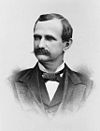 Leonidas C. Houk | Republican | March 4, 1879 – May 25, 1891 | [Data unknown/missing.] Died. | |
Vacant | May 25, 1891 – December 7, 1891 | |||
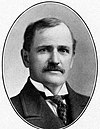 John C. Houk | Republican | December 7, 1891 – March 3, 1895 | Succeeded his father | |
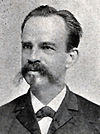 Henry R. Gibson | Republican | March 4, 1895 – March 3, 1905 | [Data unknown/missing.] | |
 Nathan W. Hale | Republican | March 4, 1905 – March 3, 1909 | [Data unknown/missing.] | |
 Richard W. Austin | Republican | March 4, 1909 – March 3, 1919 | [Data unknown/missing.] | |
 J. Will Taylor | Republican | March 4, 1919 – November 14, 1939 | [Data unknown/missing.] Died. | |
Vacant | November 14, 1939 – December 30, 1939 | |||
 John Jennings Jr. | Republican | December 30, 1939 – January 3, 1951 | [Data unknown/missing.] | |
 Howard H. Baker, Sr. | Republican | January 3, 1951 – January 7, 1964 | [Data unknown/missing.] Died. | |
Vacant | January 7, 1964 – March 10, 1964 | |||
 Irene B. Baker | Republican | March 10, 1964 – January 3, 1965 | Succeeded her husband | |
 John J. Duncan, Sr. | Republican | January 3, 1965 – June 21, 1988 | [Data unknown/missing.] Died. | |
Vacant | June 21, 1988 – November 7, 1988 | |||
 John J. Duncan Jr. | Republican | November 8, 1988 – January 3, 2019 | [Data unknown/missing.] Retired. | |
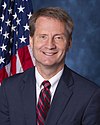 Tim Burchett | Republican | Term started January 3, 2019 | Incumbent. | |
Historical district boundaries
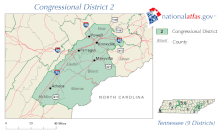
2003 - 2013
See also
- Tennessee's congressional districts
- List of United States congressional districts
References
^ https://www.census.gov/geo/maps-data/data/cd_state.html
^ https://www.census.gov/mycd/?st=47&cd=02
^ https://www.census.gov/mycd/?st=47&cd=02
^ "Partisan Voting Index – Districts of the 115th Congress" (PDF). The Cook Political Report. April 7, 2017. Retrieved April 7, 2017..mw-parser-output cite.citation{font-style:inherit}.mw-parser-output .citation q{quotes:"""""""'""'"}.mw-parser-output .citation .cs1-lock-free a{background:url("//upload.wikimedia.org/wikipedia/commons/thumb/6/65/Lock-green.svg/9px-Lock-green.svg.png")no-repeat;background-position:right .1em center}.mw-parser-output .citation .cs1-lock-limited a,.mw-parser-output .citation .cs1-lock-registration a{background:url("//upload.wikimedia.org/wikipedia/commons/thumb/d/d6/Lock-gray-alt-2.svg/9px-Lock-gray-alt-2.svg.png")no-repeat;background-position:right .1em center}.mw-parser-output .citation .cs1-lock-subscription a{background:url("//upload.wikimedia.org/wikipedia/commons/thumb/a/aa/Lock-red-alt-2.svg/9px-Lock-red-alt-2.svg.png")no-repeat;background-position:right .1em center}.mw-parser-output .cs1-subscription,.mw-parser-output .cs1-registration{color:#555}.mw-parser-output .cs1-subscription span,.mw-parser-output .cs1-registration span{border-bottom:1px dotted;cursor:help}.mw-parser-output .cs1-ws-icon a{background:url("//upload.wikimedia.org/wikipedia/commons/thumb/4/4c/Wikisource-logo.svg/12px-Wikisource-logo.svg.png")no-repeat;background-position:right .1em center}.mw-parser-output code.cs1-code{color:inherit;background:inherit;border:inherit;padding:inherit}.mw-parser-output .cs1-hidden-error{display:none;font-size:100%}.mw-parser-output .cs1-visible-error{font-size:100%}.mw-parser-output .cs1-maint{display:none;color:#33aa33;margin-left:0.3em}.mw-parser-output .cs1-subscription,.mw-parser-output .cs1-registration,.mw-parser-output .cs1-format{font-size:95%}.mw-parser-output .cs1-kern-left,.mw-parser-output .cs1-kern-wl-left{padding-left:0.2em}.mw-parser-output .cs1-kern-right,.mw-parser-output .cs1-kern-wl-right{padding-right:0.2em}
Martis, Kenneth C. (1989). The Historical Atlas of Political Parties in the United States Congress. New York: Macmillan Publishing Company.
Martis, Kenneth C. (1982). The Historical Atlas of United States Congressional Districts. New York: Macmillan Publishing Company.
- Congressional Biographical Directory of the United States 1774–present
Coordinates: 36°03′01″N 83°49′16″W / 36.05028°N 83.82111°W / 36.05028; -83.82111